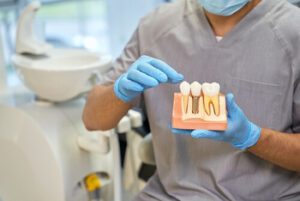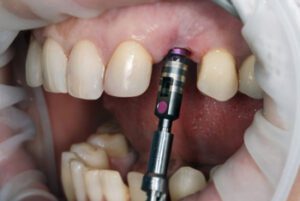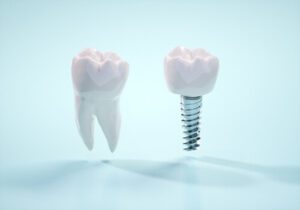If you’ve lost one or more teeth, chances are you’ve encountered dental implants as a long-term solution. And with the rising popularity of dental tourism, dental implants in Manila might seem like an appealing, budget-friendly choice. But is it truly the best option for your smile and your health?
In this blog, we’ll explore the subject of dental implants, compare the process and outcomes between Manila and Australia, and explain why more Australians still choose to undergo this surgical procedure locally despite the upfront cost.
What Are Dental Implants Exactly?
Dental implants are a modern and reliable way to replace missing teeth. They are surgically placed into the jawbone, unlike dentures or bridges, which sit on top of the gums or rely on surrounding teeth. Dental implants serve as artificial tooth roots, usually made from medical grade titanium, which fuses with the bone over time through a process called osseointegration.
Once the implant has successfully merged with the jaw, it forms a sturdy foundation for a dental crown, bridge, or even a full arch of teeth. This makes it a long term, fixed solution that feels and operates much like your natural teeth.
- They help maintain jawbone health by stimulating bone growth
- They restore your ability to eat, chew and speak with ease
- They support facial structure and prevent that sunken look from tooth loss
- They blend seamlessly with your smile for a natural appearance
Whether you’re missing a single tooth or several, implant dentistry provides a permanent and dependable alternative to traditional tooth replacement options.
Why People Are Travelling for Dental Implants
There’s no doubt that affordable dental treatments are a huge draw. Countries like the Philippines, Thailand, and Vietnam market dental tourism heavily. In cities like Manila, dental implant clinics often advertise packages that combine a tropical holiday with quick and cheap dental solutions.
The average dental implants price in Manila starts at a lower cost than in Australia, which is why some people feel tempted to book a trip. But there’s more to implant dentistry than just the initial price tag.
Before You Book That Dental Holiday: The Risks of Going Abroad for Implants
When it comes to restoring your smile, it’s understandable to want to save money. That’s why many people consider cheap dental implants overseas, particularly in places like Manila, Thailand, or Vietnam. On the surface, the dental implants cost appears significantly lower than in Australia. But while the idea of combining a tropical holiday with affordable dental treatments may be tempting, it’s important to look beyond the price tag.
Here’s a closer look at the real risks involved in going abroad for implant dentistry and why cutting corners on your health can lead to costly complications.
1. Lack of Standardised Regulation
Australian dental clinics and dental practitioners must follow strict national guidelines set by regulatory bodies like the Dental Board of Australia and AHPRA. This guarantees that your dental implant procedure is performed by an appropriately qualified health practitioner using approved methods and sterile equipment.
Overseas, these safeguards may not always be in place. Even reputable dental implant clinics abroad might not adhere to the same hygiene protocols, quality control systems, or professional training standards, increasing the risk of infection or improper implant placement.
2. Increased Risk of Complications
A surgical or invasive procedure like implant surgery is not without its risks, even in the safest of hands. But when done overseas, the likelihood of complications such as nerve damage, poor integration, or infection is often higher due to:
- Limited diagnostic tools or outdated technology
- Compressed treatment timelines (rushing what should be a staged healing process)
- Lack of thorough post operative monitoring
- Language barriers that affect communication and informed consent
If complications arise once you return home, you may face not only medical stress but also significant financial burdens to correct the issue.
3. Limited or No Follow Up Care
One of the biggest shortcomings of dental implants abroad is the lack of consistent follow-up care. Healing from implant surgery takes time, and unexpected issues can sometimes develop weeks or even months after the procedure is complete. When you’re treated overseas, your original provider is often thousands of kilometres away, making follow up appointments impractical or impossible.
Without regular checks from your original dentist, small problems can go unnoticed until they become serious, requiring corrective procedures at home that can be far more expensive than the original cost of having the implant done locally.
4. Unexpected Hidden Costs
Many affordable dental implant packages abroad exclude key aspects of the dental implant process, such as:
- Initial consultations and imaging
- Temporary prosthetics during the healing phase
- Additional surgeries like bone grafting if the jaw bone is insufficient
- Emergency care if something goes wrong
When these extras are added, the overall dental implants price may end up being much higher than initially advertised. Worse still, if the treatment fails and needs to be redone in Australia, you could find yourself paying twice, once overseas, and again at home.
5. Potential for Poor Outcomes or Implant Failure
Successful dental implants require precise treatment planning, high quality materials, and a skilled dentist who can customise the procedure to suit your specific dental structure and needs. Unfortunately, budget procedures overseas may skip vital planning steps or use low-cost materials, which can result in:
- Misaligned implants
- Loose or poorly fitting crowns
- Implants that fail to bond with the bone
- Long term bone loss and gum complications
These outcomes can not only compromise your oral health but also cause pain, aesthetic issues, and the need for repeated surgeries.
6. No Legal or Professional Recourse
In Australia, if something goes wrong with your dental treatment, you have access to legal protections, complaint pathways, and insurance. Overseas, this is rarely the case. If you’re unhappy with your results or suffer from poor treatment, you may have no avenue for recourse.
This can leave you feeling helpless and frustrated, especially after investing your time, money, and trust in what seemed like a convenient solution.
Understanding What Affects the Cost of Dental Implants in Australia
In Australia, a single dental implant typically starts from around 3,000 AUD. The total dental implant cost varies based on several key factors:
- The number of implants required
- Whether you need bone grafting or advanced surgical procedures
- The experience of your dentist
- The quality of materials used, such as titanium implant posts
- Use of cutting edge technology for precise treatment planning
- Type of sedation and the clinic’s location
While this may seem like a bigger upfront cost, what you’re paying for is comprehensive care, superior materials, and a higher standard of safety throughout your treatment journey.
Quality Dental Care: What Australian Clinics Do Differently
When it comes to something as important as your smile, quality matters, while the idea of travelling abroad for affordable dental implants might seem appealing, there are key reasons why so many Australians still choose to have their dental implant treatment done locally. It’s not just about convenience it’s about trust, safety, and results that last.
Let’s explore what sets Australian dental clinics apart and why they’re considered a gold standard for implant dentistry.
1. Highly Qualified Dental Professionals
In Australia, only an appropriately qualified health practitioner can legally perform dental implant surgery. Dentists must undergo extensive education and training, followed by continuous professional development, to stay current with new technologies and procedures. You can be confident that your care is in the hands of professionals who meet the strict standards set by national health regulators.
2. Strict Health and Safety Regulations
Unlike some overseas clinics, Australian clinics are required to follow rigorous health and safety protocols. These include:
- Proper sterilisation and infection control procedures
- Clear patient consent and treatment planning processes
- Transparency about the risks of surgical or invasive procedures
- Full compliance with the Australian Dental Association’s code of conduct
This high level of regulation helps reduce the risk of infection, surgical error, or poor implant placement, ensuring a safer and more predictable outcome.
3. Access to Advanced Technology
Modern dental implant clinics in Australia are equipped with cutting-edge technology, including:
- 3D cone beam CT scans for detailed imaging
- Digital impressions for custom dental crowns
- Guided surgery tools for precise implant positioning
- Planning software that maps your entire implant procedure
This advanced technology enhances precision, reduces the risk of complications, and makes the entire treatment process smoother and more comfortable for patients.
4. Tailored Treatment and Comprehensive Care
Australian dental clinics offer truly personalised care. From your initial consultation to your last follow up care appointment, everything is designed around your individual needs. Your dentist will:
- Assess your oral health, bone density, and suitability for implants
- Discuss whether you need bone grafting or other advanced surgical procedures
- Create a detailed, transparent treatment plan outlining all costs and timelines
- Provide you with ongoing support during the healing process
Rather than a rushed or one-size-fits-all approach, you receive care that prioritises both short-term success and long-term health.
5. Continuity of Care Close to Home
When you choose a local clinic, your care doesn’t end after surgery. You have easy access to your dental team throughout your healing period and beyond. If complications arise or you need adjustments, your dentist is just a phone call or a short drive away.
This continuity is essential for managing the full dental implant process, from surgery to the final placement of your replacement tooth. It also gives you peace of mind knowing you’re supported every step of the way.
6. Transparency and Trust
Australian clinics are committed to informed consent, meaning you’ll be made aware of all potential risks, costs, and alternatives before any dental procedure begins. This includes:
- Understanding that dental implants require surgery and recovery time
- Knowing what your health fund or financing options can cover
- Having access to second opinions or additional advice, if needed
There are no hidden fees or vague promises, just honest, open communication focused on your best interests.
What Happens During the Dental Implant Process? Let’s Break It Down
If you’re thinking about getting dental implants, knowing what to expect can help you feel more confident and ready for the journey. While each case is unique, the general dental implant procedure follows several key stages, each designed to ensure the best possible outcome for your oral health.
1. Initial Consultation
Your dentist examines your oral health, reviews scans, and checks if your jaw bone can support implants. Bone grafting may be recommended if needed.
2. Treatment Planning
A personalised plan is created, detailing how many implants you’ll need and whether additional procedures are required for optimal results.
3. Implant Placement
Under local anaesthesia, a titanium implant post is placed into the jaw. This is followed by a healing process where the implant fuses with the bone.
4. Healing and Post-Op Care
Healing takes 3 to 6 months. You’ll need to maintain good hygiene, follow your dentist’s instructions, and attend check ups to monitor progress.
5. Abutment Placement
A small connector piece, known as an abutment, is secured to the implant to support the final tooth restoration. This holds your final replacement tooth or dental crown.
6. Final Crown Placement
A custom-made crown is securely fitted to complete your smile. For multiple implants, you may receive a bridge or full arch restoration.
7. Ongoing Maintenance
Long-term success depends on regular brushing, flossing, dental checkups, and avoiding hard foods. With the right care and maintenance, dental implants have the potential to last for many decades.
Dental Implants Are a Surgical or Invasive Procedure: Don’t Forget That
It’s important to remember that dental implants require oral surgery. Every surgical or invasive procedure carries risks, such as infection, nerve damage, or implant failure. Managing these risks safely requires not only skill but also the right tools and environment.
In Australia, infection control is governed by strict national protocols. In contrast, even the best dental clinics abroad may not be held to the same level of regulatory oversight.
What Happens if Something Goes Wrong?
One of the main concerns with dental implants abroad is what happens after you fly back home. If the implant fails or if you experience pain, infection, or bone issues, you may need to visit another dentist for emergency care.
Unfortunately, Australian dentists may have to start the process all over again, particularly if poorly done implant work has caused bone loss or damage. This means more time, more money, and potentially more invasive interventions.
Is the Upfront Cost Worth It?
When you invest in implant dentistry in Australia, you’re not just buying a product but an entire ecosystem of quality dental care, support, and peace of mind.
Think about it this way: you wouldn’t choose the cheapest option for heart surgery or a hip replacement. Your teeth deserve the same level of respect and investment.
Final Thoughts: Dental Implants Offer More Than a Beautiful Smile
Tooth loss can feel overwhelming, but dental implants offer a lasting solution that brings back your smile, function, and confidence.
And while dental implants in Manila may offer lower prices, it’s crucial to weigh those savings against long term value, safety, and support. Australian dental clinics offer comprehensive care, covering everything from initial consultation to surgery, recovery, and long term maintenance.
When it comes to your smile, take the path that offers security, quality, and a lasting result.
Need More Information?
If you’re considering dental implants, book an appointment with Balmoral Dental Centre at (07) 3113 9789. They’ll walk you through every aspect of the process, assess your dental health, and help determine the best plan for restoring your natural teeth.
Note: Any surgical or invasive procedure carries risks. Before proceeding, you should seek a second opinion from an appropriately qualified health practitioner.
References
- Healthline. (n.d.). Dental anesthesia: Types, side effects, and more. https://www.healthline.com/health/dental-and-oral-health/dental-anesthesia
- Mayo Clinic. (n.d.). Dental implant surgery. https://www.mayoclinic.org/tests-procedures/dental-implant-surgery/about/pac-20384622
- Colgate. (n.d.). Dental tourism: 5 risks of traveling for a dental procedure. https://www.colgate.com/en-us/oral-health/dental-visits/dental-tourism-5-risks-of-traveling-for-a-dental-procedure
- Australian Dental Association. (n.d.). https://ada.org.au/
- Cleveland Clinic. (n.d.). Oral hygiene. https://my.clevelandclinic.org/health/treatments/16914-oral-hygiene




